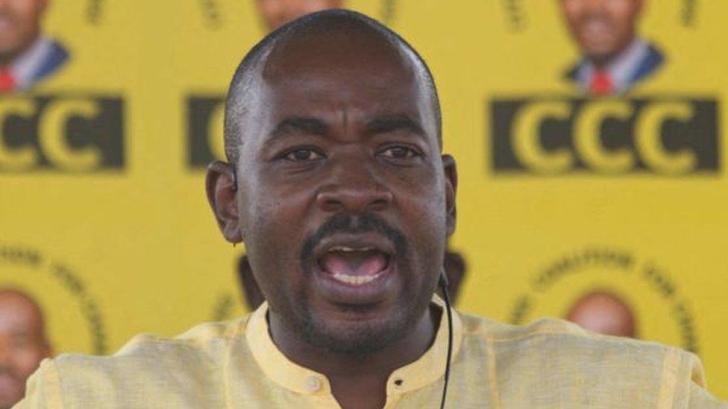News / National
Chamisa did not want Welshman Ncube and Tendai Biti in CCC
04 Dec 2024 at 15:30hrs |
0 Views

Political commentator Brighton Mutebuka has criticized U.S.-based opposition activist Freeman Chari for his claims that Nelson Chamisa, the former leader of the Citizens Coalition for Change (CCC), undermined the movement with his doctrine of "Strategic Ambiguity."
Chari alleged that Chamisa deviated from the foundational agreements made at the CCC's inception, particularly on adopting a formal constitution and structured organization. He argued that this shift compromised the movement's integrity and weakened its democratic principles.
However, Mutebuka took to social media platform X to defend Chamisa's actions, accusing Chari of breaching confidentiality by publicly sharing sensitive internal discussions.
Mutebuka argued that Chamisa's reluctance to fully embrace former senior MDC officials like Welshman Ncube, Tendai Biti, and Job Sikhala stemmed from a lack of trust, a sentiment exacerbated by the historical breakaways that weakened the opposition under the late Morgan Tsvangirai's leadership.
"There was no love lost between Chamisa and his erstwhile colleagues from the Tsvangirai era. He was forced to embrace them when he inherited the MDC Alliance. Trust and confidence were low," Mutebuka stated.
He explained that Chamisa's strategy of "Strategic Ambiguity" was a response to infiltration threats and attempts to hijack the party, especially in the wake of Douglas Mwonzora's controversial maneuvers within the MDC-T.
"Strategic Ambiguity and the adoption of a draft constitution were extreme measures aimed at stemming infiltration and sabotage," Mutebuka wrote.
Mutebuka acknowledged that while Chamisa's strategy exposed alleged state infiltration of the CCC, it came at the cost of reputational damage. He claimed that President Emmerson Mnangagwa's regime exploited these internal vulnerabilities to destabilize the party.
"Every strategy has pros and cons. Strategic Ambiguity succeeded in exposing Mnangagwa's infiltration of CCC but harmed its reputation domestically and internationally," he wrote.
Mutebuka argued that the CCC's current paralysis is rooted in state infiltration rather than Chamisa's leadership decisions. He supported Chamisa's decision to break away from past structures and start anew.
"By breaking free and starting afresh, Chamisa has one final chance to create a project on his own terms. It's for the best to draw a line in the sand concerning a painful and traumatic past," he concluded.
This public exchange highlights ongoing tensions within Zimbabwe's opposition, as it grapples with internal fractures and external challenges. With the CCC undergoing a potential reformation, questions about leadership, trust, and strategy remain central to its future trajectory.
Chari alleged that Chamisa deviated from the foundational agreements made at the CCC's inception, particularly on adopting a formal constitution and structured organization. He argued that this shift compromised the movement's integrity and weakened its democratic principles.
However, Mutebuka took to social media platform X to defend Chamisa's actions, accusing Chari of breaching confidentiality by publicly sharing sensitive internal discussions.
Mutebuka argued that Chamisa's reluctance to fully embrace former senior MDC officials like Welshman Ncube, Tendai Biti, and Job Sikhala stemmed from a lack of trust, a sentiment exacerbated by the historical breakaways that weakened the opposition under the late Morgan Tsvangirai's leadership.
"There was no love lost between Chamisa and his erstwhile colleagues from the Tsvangirai era. He was forced to embrace them when he inherited the MDC Alliance. Trust and confidence were low," Mutebuka stated.
He explained that Chamisa's strategy of "Strategic Ambiguity" was a response to infiltration threats and attempts to hijack the party, especially in the wake of Douglas Mwonzora's controversial maneuvers within the MDC-T.
Mutebuka acknowledged that while Chamisa's strategy exposed alleged state infiltration of the CCC, it came at the cost of reputational damage. He claimed that President Emmerson Mnangagwa's regime exploited these internal vulnerabilities to destabilize the party.
"Every strategy has pros and cons. Strategic Ambiguity succeeded in exposing Mnangagwa's infiltration of CCC but harmed its reputation domestically and internationally," he wrote.
Mutebuka argued that the CCC's current paralysis is rooted in state infiltration rather than Chamisa's leadership decisions. He supported Chamisa's decision to break away from past structures and start anew.
"By breaking free and starting afresh, Chamisa has one final chance to create a project on his own terms. It's for the best to draw a line in the sand concerning a painful and traumatic past," he concluded.
This public exchange highlights ongoing tensions within Zimbabwe's opposition, as it grapples with internal fractures and external challenges. With the CCC undergoing a potential reformation, questions about leadership, trust, and strategy remain central to its future trajectory.
Source - pindula
Join the discussion
Loading comments…
































